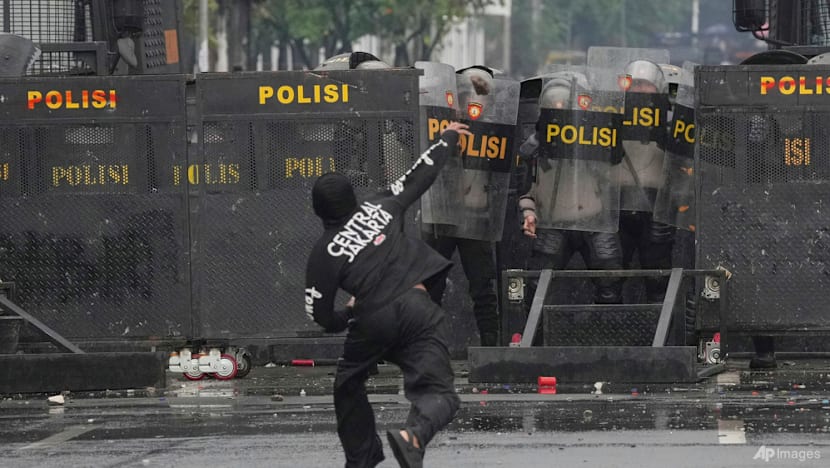Commentary: Indonesia’s protests are the result of anger that's been building for years
Indonesia's Prabowo Subianto has spent much of his presidency building a more assertive foreign policy. Now, he must focus on governing at home, says political analyst Johannes Nugroho.

Police officers cover themselves with riot shields as a protester throws rocks at them during a protest outside the parliament in Jakarta, Indonesia, on Aug 31, 2025. (Photo: AP/Dita Alangkara)

This audio is generated by an AI tool.
SURABAYA, Indonesia: Almost 30 years ago, the deaths of four Indonesian university student protesters in Jakarta, shot by army personnel, sparked the 1998 nationwide mass protests that eventually brought down then-President Suharto’s 32-year rule.
Fast forward to 2025, the death of Gojek rider Affan Kurniawan - who was out delivering a food order, not protesting, when a police vehicle ran over him during a demonstration in Jakarta last week - has once again mobilised thousands onto the streets, leaving in their wake torched government buildings and police stations across the country as well as looted residences of several government officials.
President Prabowo Subianto, confronted with the gravest crisis since he took office last year, has bowed to some of the policy changes that protesters have been calling for and pledged a transparent investigation into what he called “excessive police actions”. He has also cancelled a high-profile visit to China, citing the need to monitor the situation “directly”.
These gestures signal that the administration is aware of the public mood and feels compelled to respond, at least symbolically.
As an army general witnessing the May 1998 riots, Mr Prabowo no doubt recalls that his former father-in-law, Suharto, was away in Egypt when riots broke out unchecked in Jakarta.
ECONOMIC FRUSTRATION RUNS DEEP
The week that shook Indonesia to its core began on Aug 25, when demonstrators converged on the parliament building to protest a rise in lawmakers’ take-home pay, which is already 42 times the minimum wage in Jakarta.
The second wave of protests took place two days later, led by labour unions demanding an end to outsourcing practices and a hike in the minimum wage. Protesters tried to storm into the parliament building and police responded with water cannons and tear gas. That evening, a police armoured vehicle attempting to clear the street ran over Mr Affan.
At least eight people have died in the protests, which stretched into the weekend across cities and towns throughout Indonesia, with the police force bearing the brunt of the attacks.
What prompted this chain of events, and how should Mr Prabowo best ensure that public unrest is pacified and concerns addressed satisfactorily?
Mr Prabowo’s live address on Sunday (Aug 31) was carefully calibrated. Flanked by leaders of major political parties, he acknowledged the scale of public anger and announced that political parties in the House of Representatives had agreed to revoke a number of perks and privileges for lawmakers.
While this was the first step in the right direction, further policy U-turns and institutional reforms may be called for to ensure that nothing like this happens again on the president’s watch.
Despite calls for calm, thousands of Indonesians reportedly continued to rally across the country on Monday.
FLASHPOINTS
It is difficult to deny that the government has failed to register growing public frustration.
On Aug 13, Pati, a normally quiet town in Central Java, erupted in a massive public rally that ended in violence, over the now-rescinded plan to hike property taxes by 250 per cent.
Regional governments throughout Indonesia have scrambled to increase local taxes due to proposed cuts in their funding from the central government, somewhere between 25 and 50 per cent for the 2026 budget.
Given that the Indonesian economy has stagnated, with consumer confidence and spending taking a hit, the public has little patience for new taxes. The latest economic data also show the country’s middle class has shrunk by 16 per cent since 2019.
Public frustration also deepened when reports emerged that government officials’ income taxes are covered by state funds, highlighting the disparity faced by ordinary Indonesians who shoulder the burden themselves.
Further aggravating public sentiment is the Tapera programme, which will from 2027 require all private-sector and self-employed workers in Indonesia to contribute 3 per cent of their salaries into a public housing savings fund. The scheme is meant to help Indonesians save for a home, but many see it as another forced cut to their salaries on top of taxes they already pay.
Public perception of a disconnected elite was reinforced after videos emerged of several lawmakers dancing in parliament during the State of the Nation address on Aug 15.
When NasDem Party Member of Parliament Ahmad Sahroni called citizens who demanded the dissolution of parliament “the most stupid people on earth”, fury intensified. One of his houses in Jakarta was stormed and looted by mobs over the weekend.
KEEPING FOCUS ON DOMESTIC NEEDS
Much of this discontent reflects deeper concerns about the composition of government itself. Mr Prabowo’s ruling coalition controls 470 out of 580 parliamentary seats, or 81 per cent, rendering formal opposition negligible in its impact on the legislative process.
To address the public dissatisfaction over lawmakers not functioning as people’s representatives, both the executive and legislative branches must initiate reforms to make members of parliament more accountable to constituents.
Institutional reforms to the police force, directly under the president’s command, to effect better checks and balances, are also overdue and certainly within the presidential purview. A credible inquiry into Mr Affan’s death would be an important first step in restoring public confidence.
Mr Prabowo has spent much of his presidency building a more assertive foreign policy, as part of efforts to be a "bridge-builder" amid growing global uncertainties. Now, he must focus on governing at home. Listening to what his people need would be a good start.
Johannes Nugroho is a writer and political analyst from Surabaya, Indonesia.


















